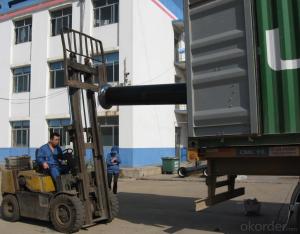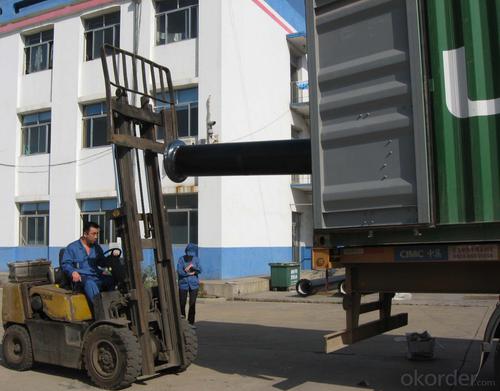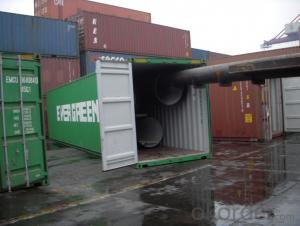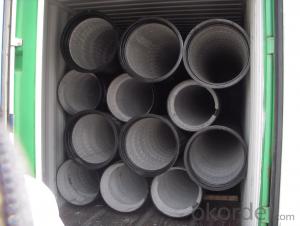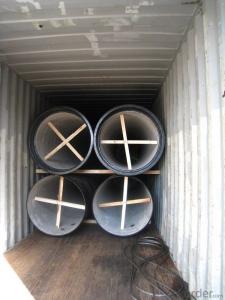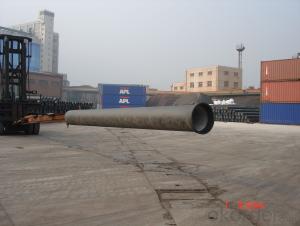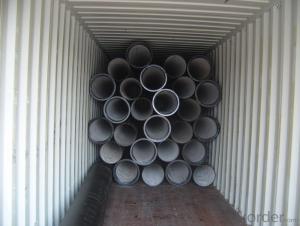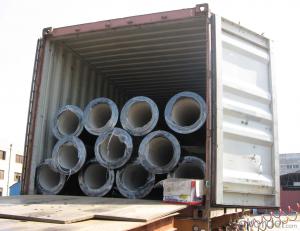DUCTILE IRON PIPE AND PIPE FITTINGS C CLASS DN400
- Loading Port:
- Tianjin
- Payment Terms:
- TT OR LC
- Min Order Qty:
- 23 pc
- Supply Capability:
- 3000 pc/month
OKorder Service Pledge
OKorder Financial Service
You Might Also Like
· Material : Ductile Cast Iron
· Size Range : DN 80mm to DN 2000mm
· Unit Effective Length : 6m or 5.7m
· Manufacture Standard: ISO 2531:1998/ EN 545:2006/EN 598:2007
· Annual capacity : 200,000 tons
· Coating Exterior: Zinc 130g/m2 according to ISO 8179-1 and bitumen coating 70 microns.
· Cement Interior: Portland Cement/ High Alumina Cement/ Sulphate Resisting Cement Lining according to ISO 4179
· Special requirements on external coating and internal lining can be applied
· We also provide accessories such as SBR/EPDM rubber gaskets, lubricant paste, pipe caps, PE sleeves, etc.
Additional Parts:
Each pipe is strictly inspected according to related standard to ensure permanently high performance.
Easy Installation at site and service free for life
Long Service Lifespan
Quotation will arrive you within 24hours once we get your inquiry.
We guarantee offering you a competitive price.
A copy of original inspection reports of pipes will be offered after shipment.
Photos of loading process will be sent to the customer after shipment effect.
We will follow-up the delivery progress after shipment effect and update to the customer on weekly basis.
- Q: Can ductile iron pipes be used for underground fuel storage systems?
- No, ductile iron pipes are not suitable for underground fuel storage systems. They are more commonly used for water and sewer applications due to their strength and durability in carrying liquids. Underground fuel storage systems require materials that are specifically designed to handle the corrosive nature of fuel and prevent leaks or contamination, such as double-walled fiberglass or steel tanks.
- Q: Ductile iron pipe in the direction of it?
- The use of cast iron by adding more than 18 nodularizer, after centrifugal ductile cast iron machine high speed centrifugal cast pipe, called "ductile" (Ductile Cast Iron Pipes), referred to as ball pipe, ductile iron pipe and ductile iron pipe etc..
- Q: Do ductile iron pipes require special handling during transportation?
- Yes, ductile iron pipes do require special handling during transportation. They are heavy and brittle, so they need to be loaded and unloaded carefully to prevent damage. Additionally, they should be properly secured and supported to avoid any bending or distortion during transit.
- Q: Can ductile iron pipes be used for water tunnel crossings?
- Yes, ductile iron pipes can be used for water tunnel crossings. Ductile iron pipes are known for their strength, durability, and resistance to corrosion, making them a suitable choice for various applications, including water tunnel crossings. They are capable of withstanding high pressure, external loads, and ground movements, which are often encountered in tunnel crossings. Additionally, ductile iron pipes have a long service life and require minimal maintenance, making them a cost-effective solution for water tunnel crossings.
- Q: What are the advantages of using ductile iron pipe over concrete pipe?
- There are several advantages of using ductile iron pipe over concrete pipe. Firstly, ductile iron pipe has superior strength and durability, with a higher resistance to cracking and breaking compared to concrete pipe. This makes it ideal for underground applications where it is subjected to heavy loads and pressure. Secondly, ductile iron pipe has a longer service life, typically lasting 50 to 100 years, compared to the 30 to 50-year lifespan of concrete pipe. Additionally, ductile iron pipe is easier to install and maintain, as it is lighter in weight and requires fewer joints. It also offers better flow capacity, reducing head loss and improving overall system efficiency. Lastly, ductile iron pipe is more resistant to corrosion, ensuring long-term reliability and reduced maintenance costs.
- Q: How are ductile iron pipes tested for quality assurance?
- Ductile iron pipes are tested for quality assurance through various methods such as hydrostatic testing, visual inspection, and mechanical testing. Hydrostatic testing involves subjecting the pipes to high-pressure water to check for any leaks or weaknesses. Visual inspection is carried out to identify any surface defects or irregularities that may affect the quality of the pipe. Mechanical testing includes conducting tensile strength tests, elongation tests, and hardness tests to ensure that the pipes meet the required standards and can withstand the intended application. These testing procedures help ensure the quality and reliability of ductile iron pipes.
- Q: Can the sealing ring of ductile iron pipe be reused?
- It is better not to have used things, easy aging, sealed, the best to use new
- Q: What are the interface forms of ductile iron pipes? The best drawings are available. Thank you
- Because of this interface and the corresponding T sealing aprons can withstand greater deflection angle and greater tolerances, especially suitable for unstable formations and corners.
- Q: Can ductile iron pipes be used in coastal or marine environments?
- Ductile iron pipes are applicable for coastal or marine environments. This type of cast iron has been treated with magnesium to enhance its strength, ductility, and resistance to corrosion. As a result, it can be used in environments with high moisture levels, like coastal or marine areas. Coastal and marine environments are characterized by their high saltwater levels, which can lead to metal pipe corrosion. However, ductile iron pipes possess an excellent resistance to corrosion thanks to their protective coating. This coating acts as a barrier between the pipe and the corrosive elements present in saltwater, preventing rust formation and prolonging the pipes' lifespan. Moreover, ductile iron pipes can withstand the high pressures and stresses associated with coastal and marine applications. They possess high tensile strength, enabling them to support the weight of soil, rocks, and other materials that may be present in these environments. Furthermore, ductile iron pipes are resilient to damage caused by external forces like waves or debris, making them a dependable choice for coastal or marine projects. In conclusion, ductile iron pipes are a suitable option for coastal or marine environments due to their corrosion resistance, high tensile strength, and durability. They can reliably transport water or other fluids in these challenging environments while maintaining their structural integrity for an extended period.
- Q: What is the weight of a typical ductile iron pipe?
- The weight of a typical ductile iron pipe can vary depending on its size and wall thickness. Generally, ductile iron pipes are available in sizes ranging from 3 inches to 64 inches in diameter. The weight of these pipes can range from a few pounds per foot for smaller sizes to several hundred pounds per foot for larger diameters. Wall thickness also plays a significant role in determining the weight of the pipe. Thicker walls will result in a heavier pipe. For instance, a 10-inch ductile iron pipe with a wall thickness of 0.25 inches may weigh around 26 pounds per foot, whereas a 24-inch ductile iron pipe with a wall thickness of 0.5 inches can weigh approximately 175 pounds per foot. It is important to consult specific manufacturer specifications or engineering references to determine the precise weight of a particular ductile iron pipe.
Send your message to us
DUCTILE IRON PIPE AND PIPE FITTINGS C CLASS DN400
- Loading Port:
- Tianjin
- Payment Terms:
- TT OR LC
- Min Order Qty:
- 23 pc
- Supply Capability:
- 3000 pc/month
OKorder Service Pledge
OKorder Financial Service
Similar products
Hot products
Hot Searches
Related keywords
